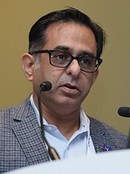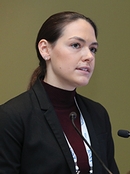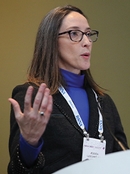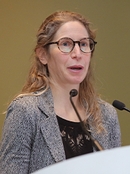
Gulani
During a Sunday morning educational course, a panel of radiologists defined the negative behaviors that disrupt professional environments and offered strategies for improving the civility and inclusiveness of the workplace.
Vikas Gulani, MD, PhD said disruptive workplace behaviors, including discrimination, bullying, harassment and a lack of teamwork, are both problematic and costly.
Dr. Gulani said radiologists should all commit to modeling the behavior we want to see. His approach includes clearly communicating the values of the department and incorporating citizenship into the department's compensation plan.
"We hire first for decency and look for individuals who can get along with other team members," said Dr. Gulani, chair of radiology at the University of Michigan.
He believes in dealing with bad behavior early and head-on with a "cup of coffee" conversation with the offender.

Pitot
Removing the Stigma in Sexual Harassment
Early in the #MeToo movement, radiology resident Marika A. Pitot, MD, joined a task force to research the prevalence of sexual harassment in radiology.
In the task force's poll of 375 radiology trainees, more than 60% reported personal experiences with sexual harassment in the workplace, from verbal remarks of a sexual nature and unwanted touching to receiving sexual messages. Identified perpetrators included training faculty, patients, senior physicians and peer physicians.
The majority of victims did not report the event, citing a belief that reporting would be futile or a fear of negatively impacting their career or retaliation. Of the 17.7% who did report an event, 65% reported not being satisfied with the resolution.
She recommended that departments clearly define sexual harassment, put systems in place for reporting, guarantee effective and thorough investigation of incidents and ensure confidentiality and lack of retribution for victims who report.
"Prevention is the best tool eliminate sexual harassment in the workplace," she said.

Leschied
Courage in the Face of Microaggressive Behavior
Microaggressions—brief verbal, behavioral or environmental indignities—are a common workplace disruption according to Jessica R. Leschied, MD. Whether intentional or unintentional, she said this type of hostile and derogatory communication is often directed toward marginalized groups.
Even the physical workplace can be non-welcoming to specific groups of people, from a lack of dressing rooms for trans and non-binary patients to an absence of leadership diversity or inadequate family leave policies.
Speaking up by asking for clarification from the microaggressor and standing up for others by challenging stereotypes are a few ways to handle microaggressions.
"Your greatest asset in the journey toward creating a more inclusive workplace is your courage," Dr. Leschied said.

Robbins
Handling Burnout With Care
Jessica Robbins, MD, concluded the course by discussing the signs of symptoms of suicidal ideation and burnout—and the steps physicians can take to help one another.
Dr. Robbins said that between 2021 and 2022, the percentage of radiologists reporting burnout increased from 36% to 50%. In another 2021 survey of 2,838 physicians and nurses worldwide, 47% reported plans to leave their current role in two to three years.
The consequences of burnout include medical errors and lower patient care quality. For physicians, it can lead to substance abuse, depression and poor self-care. This adds up to reduced productivity, increase turnover and higher costs for the healthcare system.
To help each other, Dr. Robbins recommended several strategies, beginning with active listening and offering to help think through the situation.
"Ask your colleague, 'How are you doing right now' and really listen," Dr. Robbins said. "Repeat back what you heard but offer advice only if asked. Check in on them later and familiarize yourself with the resources available for help through your organization."
Access the session, "Professional Disruptions in the Workplace," (S2-CNPM01) on demand Meeting.RSNA.org.
Have you ever had to go to HR due to disruptive behavior in the workplace? #RSNA22
— RSNA (@RSNA) November 27, 2022

